
A fence is so ubiquitous that it almost seems strange to see a yard without the time-honored structure. For centuries, humans have used them to keep animals in or out, declare ownership and separate property from others. These are certainly good reasons to have a fence, but it can be much more than just a barrier.
A fence in the garden can do many things, even all at once. The structure at left is, first and foremost, an enclosure. It firmly delineates the boundary of the garden, provides security and lends a bit of privacy to those in the garden beyond. But with soft peachy-yellow roses planted behind and tangling through the balusters, it presents a warm and welcoming appearance that is not intimidating. The fence guides visitors to the front door on an enjoyable stroll along the walkway. Brick posts match the house and unify the home with the structure and the garden. The brick and wrought iron structure even helps give the yard more personality, setting the tone for the style of garden you might find inside. That's one hardworking fence!
In the next few pages, let's take a closer look at some of the main reasons to have a fence and how it can enhance your garden most common reason to build a fence The to mark the edges of your property. This can be a physical barrier that can't be crossed, or an implied boundary that stops your eye and defines the space. It can create garden rooms in the yard, separating spaces according to their uses, for instance, a play area or a pet enclosure.
OPEN AND SHUT CASES
There are no rules for building a boundary fence. It can be made of almost anything, even living plants woven together, and any size or style. The open rail fence in photo 2 clearly sets a boundary, though it is easy to see through to the field beyond.
It will keep most people out, but if someone wanted to, they could easily climb over or through to retrieve a ball or visit the neighbors.
Bu hikaye Garden Gate dergisinin Issue 179 - October 2024 sayısından alınmıştır.
Start your 7-day Magzter GOLD free trial to access thousands of curated premium stories, and 9,000+ magazines and newspapers.
Already a subscriber ? Giriş Yap
Bu hikaye Garden Gate dergisinin Issue 179 - October 2024 sayısından alınmıştır.
Start your 7-day Magzter GOLD free trial to access thousands of curated premium stories, and 9,000+ magazines and newspapers.
Already a subscriber? Giriş Yap
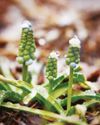
Backyard Tornado
\"HE WHO SEARCHES FOR SPRING WITH HIS KNEES IN THE MUD FINDS IT, IN ABUNDANCE.\" - ALDO LEOPOLD
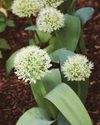
Front-of-the-Border "Wow!" Power
When it comes to easy-care plants that bring a lot of punch to the border, 'Ivory Queen' Turkestan onion should be near the top of your shopping list.
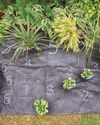
GARDEN ESSENTIALS
MAKE GARDENING EASIER THIS YEAR
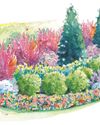
Elevate an Evergreen Hedge
Although an evergreen hedge looks suitable all year on its own, it's perfectly poised to become something even greater: a backdrop to a garden where flower after flower will unfurl with such drama, you just might find yourself stepping outside and offering your applause.

One Garden, Two Worlds
In this colorful and welcoming garden, sunny, flower-filled front borders transition to a shady backyard hideaway.
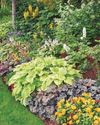
on edge
Four garden pros share their go-to edging techniques.
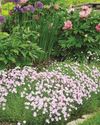
DIANTHUS
Add fragrance, vivid color and timeless charm with this reliable, cold-hardy perennial.
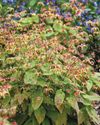
2025's Best New Plants!
Are you ready to start planning for next year's garden? A few new plants might be just what you need to bring those dreams to reality.
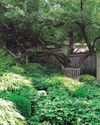
Solve Garden Problems With Ground Covers
Are you tired of coaxing turfgrass to grow in difficult spots? In her book Groundcover Revolution, Kathy Jentz says that ground covers can be the solution to these struggles.
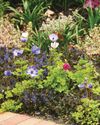
The Romance of Spring
With the arrival of spring, emerging perennials fill the garden with soft texture, restoring life to the harsh, often barren landscape of winter.